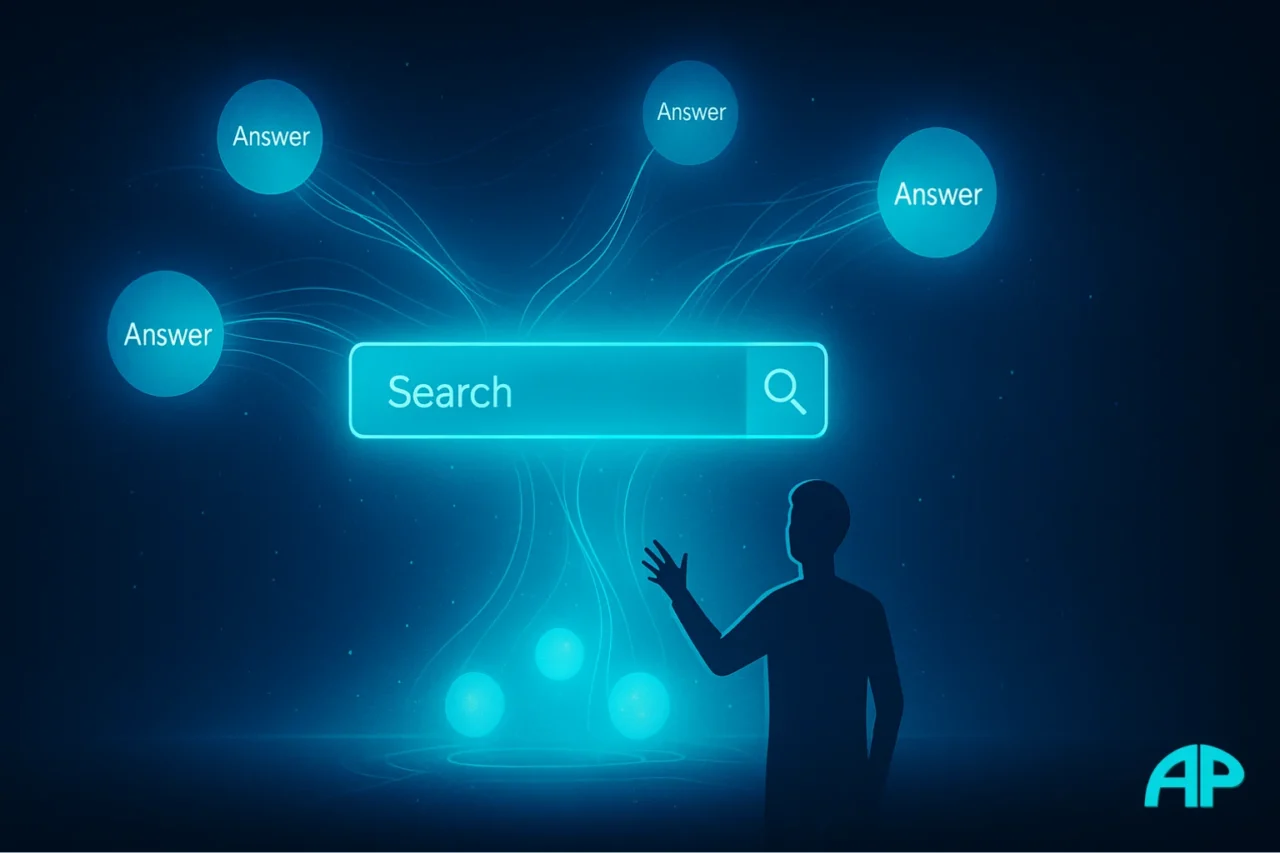Is AI search is killing Google and what it means for SEO strategies in 2025.
Table of Contents
- AI Search vs Google – What’s Up
- The Future of Search Engines
- Is SEO Dead or Just Different
- Google Alternatives in 2025
- Winning with AI-Powered Search
- SEO Strategies 2025 to Adapt
- Final Thoughts and Your Next Move
AI Search vs Google – What’s Really Happening
For more than two decades, Google has defined how we search online. Type a few words, hit enter, and you’re greeted with pages of blue links, ads, and snippets. Entire industries have been built on learning how to “play the game” from SEO agencies to affiliate marketers. But now, the game board itself is shifting.
AI search doesn’t just show you a list of results. It gives you answers. Instead of clicking through ten different pages, users can ask a question and get a conversational, personalized response. Whether it’s ChatGPT, Perplexity, or Bing’s AI integration, the experience feels more human, faster, and in many cases more accurate.
That’s the heart of the AI Search vs Google debate. Google is still powerful, but people are beginning to realize they don’t always need it. Google alternatives in 2025 are growing stronger, offering direct answers instead of cluttered search results. This isn’t just a minor competitor. It’s a new paradigm.
For businesses and bloggers, that means less guaranteed traffic from Google and more competition to be featured inside AI-generated answers. It raises big questions: How do you get your content noticed when the search engine itself is now the “middleman”? How do you win visibility when users no longer see page one because there is no page one?
The disruption is real, and it’s only just beginning.
The Future of Search Engines

The future of search engines is shifting away from lists of links and toward direct, personalized answers. People don’t just want information anymore. They want context and clarity in real time. That’s where AI-powered search is stepping in.
Unlike traditional Google results that rely on keywords and backlinks, AI-driven platforms focus on intent. They interpret not only what you type but also what you mean, making the experience feel more like a conversation than a query.
Google isn’t standing still. Its new Search Generative Experience (SGE) is designed to bring AI into the mix. But when comparing AI Search vs Google, it’s clear the old model is showing cracks. Ads dominate results, clutter is everywhere, and users are asking whether Google can still deliver unbiased answers.
At the same time, Google alternatives in 2025 are rising fast. Startups and innovators are experimenting with cleaner, faster, and more trustworthy ways to search. For entrepreneurs and creators, the takeaway is simple: success won’t come from gaming algorithms. It will come from building authority and trust in a world where search is conversational and AI-driven.
Is SEO Dead or Just Different?
Every time Google releases a major update, the same question resurfaces: is SEO dead? With the rise of AI-driven platforms, that question feels louder than ever. After all, if people can ask an AI for instant answers, why would they click through to your website?
The reality is that SEO isn’t dead. But it’s evolving into something new. Traditional tactics like keyword stuffing and chasing backlinks no longer guarantee results. Instead, success now depends on authority, trust, and creating content that AI wants to pull into its answers.
Think about the AI Search vs Google landscape. Google still relies heavily on ads and rankings, while AI-powered platforms focus on intent and context. That shift means the SEO “rules” of yesterday won’t necessarily apply in SEO strategies 2025. Content has to be structured, clear, and genuinely useful if you want it to surface in conversational search results.
So, no. SEO isn’t finished. But it’s no longer about hacking algorithms. It’s about adapting to a world where AI decides what gets seen, and where being the authority in your niche matters more than ever.
Google Alternatives in 2025
For the first time in decades, Google’s dominance is under real threat. The rise of Google alternatives in 2025 is showing that users are open to breaking old habits. Platforms like Perplexity, You.com, and ChatGPT-powered search are delivering fast, conversational answers without the clutter of ads and endless blue links.
The appeal is obvious. Instead of wading through a maze of sponsored results, users get clear, human-like responses in seconds. This is why many are saying the future of search engines will belong to whoever masters simplicity, trust, and accuracy, not whoever controls the most ad space.
But does this mean the end of Google? Not yet. With billions of users and deep pockets, Google will remain a major player. However, the AI Search vs Google debate is no longer theoretical. For many, the experience of AI-powered search feels fresher, faster, and more aligned with what they actually need.
For content creators and business owners, the lesson is clear: don’t put all your traffic eggs in the Google basket. Explore alternative platforms, diversify your reach, and get comfortable with a search world where Google isn’t the only gatekeeper.
Winning with AI-Powered Search

If Google once rewarded those who mastered backlinks and keyword density, today’s winners are the ones who understand how to optimize for AI-powered search. The rules are different, and so are the opportunities.
AI platforms don’t simply rank websites. They summarize them. That means your content has to be clear, structured, and authoritative if you want to be pulled into an answer. Lists, FAQs, and step-by-step guides perform well because they’re easy for AI to interpret. Long, bloated articles with no clear structure? They’ll be skipped over.
This is where the AI Search vs Google debate becomes practical. Google is still indexing billions of sites, but AI tools are cherry-picking the best information to feed users directly. If your content is formatted to answer specific questions, you’re far more likely to be featured.
Another key factor is authority. AI systems are designed to trust reliable sources. Building backlinks, credibility, and an online presence still matter, but now they’re not just for ranking. They determine whether your voice gets included in AI summaries at all.
Adapting to AI-powered search doesn’t mean abandoning SEO. It means upgrading it.
SEO Strategies 2025 – Adapting to the Shift
So what do smart marketers and entrepreneurs need to do right now? The answer lies in shaping your approach to match SEO strategies 2025, not clinging to outdated methods that no longer move the needle.
The first step is to think like AI. Instead of obsessing over keyword placement alone, focus on answering specific questions clearly and concisely. Build content in formats that AI-powered search engines can easily pull into responses — FAQs, bullet-point lists, and well-structured guides.
Second, double down on authority. Being seen as a trusted voice in your niche is no longer optional. Backlinks from credible sources, consistent publishing, and a strong personal or business brand all raise your chances of being included when AI Search vs Google decides which content to surface.
Third, expand your reach beyond Google. With Google alternatives in 2025 gaining traction, repurpose your content across multiple platforms from YouTube to AI-driven knowledge engines to diversify your visibility.
The bottom line? SEO strategies 2025 aren’t about chasing loopholes. They’re about building clarity, trust, and adaptability in a search landscape that’s moving fast.
Final Thoughts – AI Search vs Google and Your Next Move
The debate of AI Search vs Google isn’t about who wins today. It’s about how the future of search unfolds. Google isn’t going to disappear overnight, but its monopoly on how people find information is finally being challenged. AI-driven platforms are offering faster, cleaner, and often more relevant answers, and users are noticing.
So, is SEO dead? No. But it’s not the same game it once was. The winners in this new landscape will be those who adapt their SEO strategies 2025 to match how people actually search: conversationally, contextually, and with a demand for instant clarity.
For creators, entrepreneurs, and affiliate marketers, the path forward is clear. Focus on building authority, crafting content that’s structured and useful, and expanding beyond Google to Google alternatives in 2025. Don’t resist the change. Leverage it.
At the end of the day, the real choice is whether you’ll keep chasing old methods or embrace where search is heading. If you’re looking for expertise and advice on all things digital, including search engine optimization specialists, check out Team WebWork — a trusted partner in navigating the evolving online landscape.
And if you’re just starting out, make sure you read our guide on Affiliate Marketing for Beginners. It’s the perfect place to learn how to build a business that thrives in this new era of search.
If you’re ready to evolve with the times, AI-powered search doesn’t have to be a threat. It can be your biggest opportunity yet.


